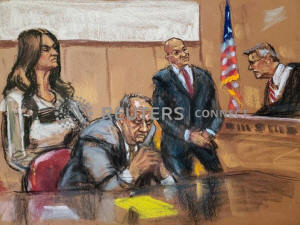Judge threatens Harvey Weinstein with jail for texting in court
 Send a link to a friend
Send a link to a friend
 [January 08, 2020]
By Gabriella Borter and Brendan Pierson [January 08, 2020]
By Gabriella Borter and Brendan Pierson
NEW YORK (Reuters) - Harvey Weinstein's
rape trial took a dramatic turn on Tuesday as the judge threatened to
revoke his bail and jail the former film producer after catching him
using his cellphone just as jury selection got underway.
“Is this really the way you want to end up in jail for the rest of your
life, by texting and violating a court order?” state Judge James Burke
asked the 67-year-old defendant, visibly angry.
“I’m not looking for apologies; I’m looking for compliance,” Burke said.
The once-powerful producer has been released on bail, but is required to
wear an electronic-tracking device that was visible on his ankle when he
arrived at court on Tuesday.
Weinstein has pleaded not guilty to charges of assaulting two women in
New York. He faces life in prison if convicted on the most serious
charge, predatory sexual assault.
Jury selection began with Burke speaking to 120 potential jurors in the
courtroom about the importance of jury service and telling them the
identity of the defendant.
“Having heard of him, or even having heard the allegations made against
him in the press, does not disqualify you,” he told them.

Forty of the potential jurors said they could not be impartial in the
case, and were allowed to leave. Others were excused after speaking to
the judge and lawyers in private about why it would be a hardship for
them to serve.
Burke read to jurors a list of dozens of names that might come up at the
trial, including actresses Salma Hayek and Charlize Theron, who have
accused Weinstein of misconduct.
That message propelled the #MeToo movement, which prompted women to
lodge misconduct allegations against powerful men in politics and
business.
Burke did not say if the people he mentioned would be called as
witnesses.
Prosecutors have said they may call three women to testify about
encounters with Weinstein, even though he is not formally charged with
crimes against them. Their testimony is intended to bolster the charges
by showing that Weinstein had a consistent pattern of behavior.
When the day's proceedings ended just after 3 p.m. (1800 GMT), Burke
said just 36 of the 120 jurors called in the morning remained in the
running. Those who made the cut were sent home with written
questionnaires and ordered to return on Jan. 16 for the second phase of
jury selection, in which the final panel will be chosen.
Another large group of jurors is expected to be screened on Wednesday.
On Monday, hours after Weinstein's trial in New York started, Los
Angeles District Attorney Jackie Lacey charged Weinstein with the sexual
assault of two unidentified women in 2013.
[to top of second column]
|

Judge James Burke scolds film producer Harvey Weinstein as he sits
beside lawyers Donna Rotunno and Arthur Aidala in Criminal Court on
the second day of his sexual assault trial in the Manhattan borough
of New York City, New York, U.S., January 7, 2020. REUTERS/Jane
Rosenberg

More than 80 women have accused Weinstein of sexual misconduct
dating back decades.
Weinstein has denied the allegations, saying any sexual encounters
he had were consensual.
Burke denied a request by one of Weinstein's lawyers, Arthur Aidala,
to delay the trial or at least allow more time for jury selection
because Monday's charges would make it impossible to choose a fair
and impartial jury this week.
“I cannot think of one time, one case where the day of jury
selection this type of prejudice is being cast against a criminal
defendant,” said Aidala, who held up copies of the New York Times,
Daily News and New York Post with articles about the Los Angeles
charges.
“I don’t see how anyone could answer honestly that they’re fair and
impartial after this stuff is drilled into their brains,” he said.
Legal experts said the #MeToo movement and Monday's charges would
make jury selection challenging in the trial of Weinstein, who made
his mark with low-budget, critically acclaimed films such as "The
English Patient" and "Shakespeare in Love."
"The defendant, Harvey Weinstein is a film producer," stated the
form with 55 questions potential jurors were asked to answer. "Can
you assure all parties that you will determine this case based only
on the evidence you will hear in Court?"
Jurors were also asked if they had read about the case or Weinstein,
if they or a family member was ever a victim of sexual abuse or if
they or a family member ever worked in the entertainment business.
Lucian Chalfen, a spokesman for the Office of Court Administration,
said the 2,000 jurors summoned for the Weinstein case is roughly
five times the number for a typical trial. Based on past experience,
about 500 were likely to show up for jury duty.

Prosecutors need all 12 jurors to back a conviction, while Weinstein
needs just one holdout for a hung jury.
(Reporting by Gabriella Borter in New York; Additional reporting by
Tom Hals in Wilmington, Delaware, and Brendan Pierson in New York;
Editing by Noeleen Walder and Jonathan Oatis)
[© 2020 Thomson Reuters. All rights
reserved.] Copyright 2020 Reuters. All rights reserved. This material may not be published,
broadcast, rewritten or redistributed.
Thompson Reuters is solely responsible for this content. |